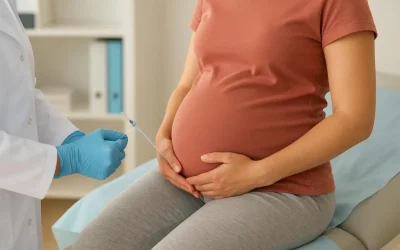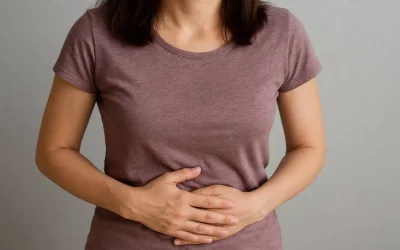Getting Pregnant After Ectopic Pregnancy: A Hopeful Guide

Experiencing an ectopic pregnancy is a deeply distressing event, filled with both physical and emotional pain. As you begin to heal, it’s natural for your thoughts to turn to the future and the possibility of trying for another baby.
The path forward can feel uncertain, filled with questions about timing, risks, and your chances of success.
This guide is here to offer clarity and support. We understand the mix of hope and anxiety you might be feeling.
We will walk you through the essential information you need, from understanding your body’s recovery to practical steps you can take when you feel ready to try to conceive again.
We’ll cover how long you should wait, what your chances of a healthy pregnancy are, and how to best prepare your body and mind. This is a journey of healing and hope, and you don’t have to navigate it alone.
What Is an Ectopic Pregnancy?
An ectopic pregnancy occurs when a fertilised egg implants and grows outside the main cavity of the uterus. Most ectopic pregnancies happen in a fallopian tube and are often called tubal pregnancies.
Unfortunately, an ectopic pregnancy cannot proceed normally and requires medical treatment, as the growing embryo can cause the tube to rupture, leading to life-threatening internal bleeding.
How Is an Ectopic Pregnancy Treated?
Understanding your Ectopic pregnancy treatment is key to understanding your recovery and future fertility. There are two primary methods used to treat an ectopic pregnancy.
- Medication (Methotrexate): This drug stops the cells of the embryo from growing, and the pregnancy is then absorbed by the body over several weeks. It is typically used in early, stable cases where the fallopian tube has not ruptured.
- Surgery (Laparoscopy): In this keyhole surgery, the ectopic pregnancy is removed. The procedure might involve either removing the affected fallopian tube (salpingectomy) or making an incision in the tube to remove the pregnancy and leaving the tube to heal (salpingostomy).
How Long Should You Wait to Get Pregnant After an Ectopic Pregnancy?
This is one of the most common and important questions. The answer depends on your treatment method.
⇒Waiting After Methotrexate Treatment
If you were treated with methotrexate, you must wait at least three months before trying to conceive.
This is because methotrexate is a powerful drug that interferes with how your body uses folate, which is vital for a baby’s healthy development in early pregnancy.
Waiting for this period allows the drug to completely leave your system and for your body to build its folate stores back up.
⇒Waiting After Surgical Treatment
If you had surgery, the physical recovery is often quicker. Your doctor will likely advise waiting until you have had at least two to three normal menstrual cycles.
This allows your body time to heal from the surgery and for your cycle to regulate, making it easier to track ovulation when you do start trying again. Most importantly, this waiting period gives you crucial time to grieve and emotionally recover.
|
Treatment Method |
Recommended Waiting Time |
Reason |
|
Methotrexate |
At least 3 months |
Allows the drug to clear from your system and folate levels to be restored. |
|
Surgery |
2-3 menstrual cycles |
Allows for physical healing and emotional recovery. |
What Are the Chances of Getting Pregnant After an Ectopic Pregnancy?
It is completely normal to worry about your future fertility. The good news is that many people go on to have healthy, successful pregnancies after an ectopic pregnancy.
Studies suggest that about 65% of women achieve a successful pregnancy within 18 months of an ectopic pregnancy. This figure can rise to around 85% within two years.
Your individual chances depend on several factors, including the health of your remaining fallopian tube(s) and whether there were other underlying fertility issues.
Even if one fallopian tube was removed, the remaining tube can still pick up an egg from either ovary, allowing for a natural conception.
Can You Increase Your Chances of a Healthy Pregnancy?
Yes, there are proactive steps you can take to prepare for a healthy conception and pregnancy.
1. Prioritise Your Emotional Health
The emotional toll of an ectopic pregnancy is significant. You have experienced a pregnancy loss, and it’s vital to allow yourself time and space to grieve.
Seek support from your partner, family, friends, or a professional counsellor. Charities like The Ectopic Pregnancy Trust offer invaluable resources and support networks.
2. Take a Folic Acid Supplement
Start taking a daily folic acid supplement as soon as you are cleared by your doctor to do so, and especially before you start trying to conceive.
A dose of 400 micrograms is typically recommended, but your doctor may advise a higher dose depending on your medical history. This is crucial for preventing neural tube defects in a future pregnancy.
3. Track Your Ovulation
Understanding your menstrual cycle is empowering. You can track ovulation using several methods:
- Ovulation Predictor Kits (OPKs): These urine tests detect the surge in luteinising hormone (LH) that happens just before ovulation.
- Basal Body Temperature (BBT): Charting your temperature first thing every morning can show a slight increase after ovulation has occurred.
- Cervical Mucus: Monitoring changes in your cervical mucus can indicate your most fertile days.
4. Adopt a Healthy Lifestyle
General health plays a big role in fertility for both partners.
- Maintain a healthy weight: Being over or underweight can affect hormone levels and ovulation.
- Eat a balanced diet: Focus on whole foods, including fruits, vegetables, lean proteins, and whole grains.
- Exercise regularly: Moderate physical activity can improve fertility, but avoid excessive, strenuous exercise.
- Stop smoking: Smoking damages eggs and fallopian tubes, increasing the risk of another ectopic pregnancy.
- Reduce alcohol and caffeine intake: Limiting these can improve your chances of conceiving.
What Is the Risk of Having Another Ectopic Pregnancy?
The risk of having another ectopic pregnancy is higher than for someone who has never had one.
The average risk is about 10-15%. While this number can feel frightening, it’s important to flip the perspective: this means there is an 85-90% chance that your next pregnancy will be in the correct place.
Your doctor will monitor your next pregnancy very closely. As soon as you get a positive pregnancy test, you should contact your doctor or an Early Pregnancy Unit.
They will arrange for blood tests to measure your hCG levels and perform an early ultrasound scan (usually around 6-7 weeks) to confirm the pregnancy is located safely inside the uterus. This early confirmation provides immense peace of mind.
Key Takeaways
- Healing Takes Time: Allow yourself both physical and emotional time to recover before trying to conceive again.
- Follow Medical Advice: The waiting period before trying again depends on your treatment. Wait at least three months after methotrexate and 2-3 cycles after surgery.
- Future Pregnancy is Likely: Most people (around 65% within 18 months) go on to have a healthy pregnancy after an ectopic.
- Prepare Your Body: Start taking folic acid, maintain a healthy lifestyle, and consider tracking your cycle to optimise your chances.
- Early Monitoring is Essential: Your next pregnancy will be monitored closely with early scans to ensure it is in the uterus, providing reassurance.
Thinking about trying again after an ectopic pregnancy? Trust Dr. Supriya Puranik, the leading ectopic pregnancy specialist in Pune, to guide you safely toward a healthy pregnancy.
Book your consultation today and take the first step with expert care and personalized monitoring
Frequently Asked Questions (FAQ)
Q: Can I get pregnant with only one fallopian tube?
A: Yes, absolutely. You can still get pregnant with one fallopian tube. The remaining tube can pick up an egg from the ovary on either side. Ovulation does not necessarily alternate sides each month.
Q: Does treatment with methotrexate affect my fertility?
A: No, studies have shown that methotrexate treatment for an ectopic pregnancy does not have a long-term impact on your ovarian reserve or overall fertility. The three-month waiting period is to ensure the drug is out of your system for the safety of a future pregnancy.
Q: What are the first signs of another ectopic pregnancy?
A: The signs are the same as the first time and can include one-sided abdominal pain, vaginal bleeding or spotting (often dark and watery), and shoulder tip pain. If you experience any of these symptoms after a positive pregnancy test, seek urgent medical advice.
Q: How can I reduce my anxiety when I get pregnant again?
A: It’s completely normal to feel anxious. Openly communicate your fears with your healthcare provider so they can offer extra support. Requesting early scans and blood tests can provide reassurance. Many also find support groups for pregnancy after loss to be very helpful.

-
About Author
Dr. Supriya Puranik
Gynaecologist & IVF Specialist
MMC -072514 (1993)
Dr. Supriya Puranik, a renowned gynaecologist and infertility expert, leads the IVF & Gynaecology department at Sahyadri Hospitals Momstory in Shivaji Nagar, Pune. She is committed to helping couples overcome infertility challenges.





